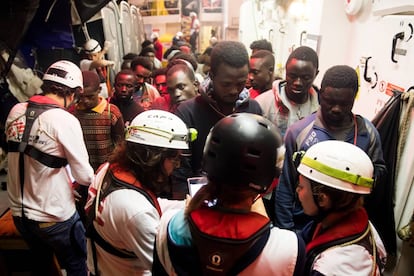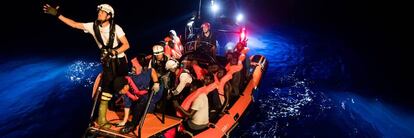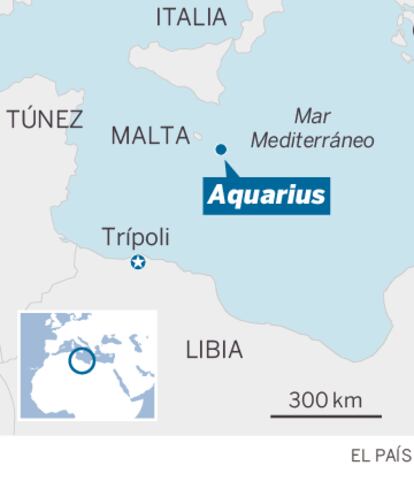The 629 migrants in search of a port
An EL PAÍS correspondent reports from on board the ‘Aquarius,’ which has rescued hundreds of immigrants off the coast of Libya, but is yet to be granted permission to dock by Italy or Malta


Kevin remembers the man’s words perfectly. “Gentlemen, please remain seated, stay calm. We are going to rescue all of you, one by one. Please help us to help you.” The 20-year-old Nigerian heard that stern but amiable phrase uttered from the mouth of Max Avis, the deputy rescue coordinator on board the Aquarius. It was a critical moment on the rickety craft on which Kevin had left Libya 25 hours previously. The small boat was stranded in the dead of night more than 50 miles from the port of Tripoli, Libya – an area that is a political battleground when it comes to migration policy. The hull was broken, and the craft was on the verge of sinking. “They gave us safety vests, we began to distribute them… but some people began to move, everyone wanted one and the accident happened,” Kevin explains. The boat gave out. All of a sudden, 40 people found themselves in the water surrounded by the darkness. A horrifying nightmare, exacerbated by the fact that not far away there was another boat that needed help, and the Aquarius was the only NGO rescue boat in the area.
The 20 year old compared what he say to a movie scene, in which he was the unfortunate protagonist. He recalled what could have been his final moments from the deck of the Aquarius, which is run by SOS Mediterranée and Doctors Without Borders (MSF). “I never thought I would survive. God had other plans for me,” he said. One by one they were rescued from the water, and they were all saved. Max and his crew are the crucial components in the sophisticated process that swings into action every time they receive a rescue warning aboard their 77-meter ship.
The hull gave out. All of a sudden, 40 people found themselves in the water surrounded by the darkness
That Saturday night was among the more intense they have experienced. In nine hours, the crew rescued 229 people from drowning – from Kevin’s ship and the other one close by. Once they were done, and despite being tired, they knew that more would come. They had previously boarded 400 people who had been rescued by Italian navy or from merchant ships some hours before.
One by one they climbed aboard. Miral the baby, born in Libya seven months ago to Moroccan parents; Rebecca, 25, from Nigeria; Mok, 23, Sierra Leone; Nasser, 34, Algeria; Adam, 29, Sudan… A total of 629 people rescued from the cold, dark water, close to death as they tried to reach their dreams of reaching Europe on a fragile vessel. The stoicism displayed by all was surreal – even from the babies and children, of whom only one was crying.

“Welcome to the Aquarius, are you okay?” the members of the NGO asked, along with the crew, who also spring into action on a rescue. Unlike the Italian Coast Guard, the crew on the Aquarius wore no gloves or masks. Each of them is given water, a blanket, clean clothes, a hat and 2,400 calories in energy bars as they arrive aboard. It is hard to describe their relief, now that they are safe and on their way to Europe. Aoife No Mhurchu, the ship’s nurse, was in charge of the triage. The women are sent to the shelter room, those who smell of gasoline to the shower, and those that arrive limping, passed out, hypothermic or overheating to a bench to wait to be attended to.
The Aquarius had spent the day zigzagging on the water, answering calls for help. Each rescue is coordinated by the Maritime Coordination Center of Rome, who gives them instructions. By Monday, the ship still did not know where to disembark the 629 people they had rescued (which include 123 unaccompanied minors and seven pregnant women). “The Aquarius has followed the orders of the Maritime Coordination Center and we are awaiting the designation of a safe port to disembark,” explained Nicola Stalla, the coordinator of search and rescue operations of SOS Mediterranée.

By the morning, the ship had received a choice between Messina and Trapani as ports from the Italian authorities. They chose the first port. However, the boat had not been officially notified about the closure of Italian ports to NGO rescue ships announced by the new Italian interior minister, Matteo Salvini, who is also the leader of the xenophobic League party. Thanks to an email in which he was in copy, Stalla knew that the Italians had called on Malta to let them dock. But the occupants of theAquarius were unaware at that point that Malta was also refusing to take them in.
“The Coordination Center has asked us to wait here for further instructions. We are 35 nautical miles away from Italy and 27 from Malta,” explained Aloys Villard, the MSF coordinator aboard the Aquarius, at around 10pm Sunday night. “Once again, political considerations are regarded higher than the safety of these people,” he added.
Nobody would put their child on a boat, unless the water was safer than the land
Warsan Shire
On Sunday morning, a man from Kevin’s ship was explaining that “the rescue boats are too far from Libya,” and called for reinforcements to “save our brothers and sisters, who are treated so badly there.” Unfortunately, nothing indicated that his wishes would come true – far from it. There are fewer and fewer NGO ships, given that political hostility toward them is on the rise. The Italian government, for example, has made it clear that it wants nothing to do with them.
As they rest and try to regain strength, the migrants on board the Aquarius do not seem to be aware that they, together with the more than 34,000 migrants who have tried to reach Europe by sea this year so far, are in the middle of a formidable political battle being fought within the European Union, a battle that has been rapidly changing due to the worrying rise of xenophobic parties since the increase in arrivals of migrants to Europe began in 2015.
“I would never put my daughter in a boat that could sink,” stated Salvini in a recent interview. The Aquarius does not only save lives, it also offers medical attention and most importantly empathy for those who have found themselves trapped in the hell that Libya has become. As written by the Anglo-Somali poet Warsan Shire wrote: “You have to understand, nobody would put their child on a boat, unless the water was safer than the land.”
When they finally disembark, the 629 migrants will run in search of a phone to call home and to find their families in Europe – at least, those who managed to survive the Mediterranean.
English version by Andres Cayuela.
Tu suscripción se está usando en otro dispositivo
¿Quieres añadir otro usuario a tu suscripción?
Si continúas leyendo en este dispositivo, no se podrá leer en el otro.
FlechaTu suscripción se está usando en otro dispositivo y solo puedes acceder a EL PAÍS desde un dispositivo a la vez.
Si quieres compartir tu cuenta, cambia tu suscripción a la modalidad Premium, así podrás añadir otro usuario. Cada uno accederá con su propia cuenta de email, lo que os permitirá personalizar vuestra experiencia en EL PAÍS.
¿Tienes una suscripción de empresa? Accede aquí para contratar más cuentas.
En el caso de no saber quién está usando tu cuenta, te recomendamos cambiar tu contraseña aquí.
Si decides continuar compartiendo tu cuenta, este mensaje se mostrará en tu dispositivo y en el de la otra persona que está usando tu cuenta de forma indefinida, afectando a tu experiencia de lectura. Puedes consultar aquí los términos y condiciones de la suscripción digital.








































